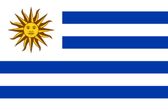
Call 0330 880 3600 Calls may be monitored or recorded. Opening Times.
- TRAVEL INSURANCE
- COVID-19 COVER
- More Options
- Help & Advice
- Existing Customers

Call 0330 880 3600 Calls may be monitored or recorded. Opening Times.

Need help?
UK Customer Services0330 880 3600*
Open Monday to Friday 9:00am to 6pm, Saturday 8:30am to 4pm and closed Sundays.
*Calls are recorded for training and quality purposes.

Official name: Oriental Republic of Uruguay
Capital city: Montevideo
Languages spoken: Spanish
Population: Around 3.5 million
Currency: Uruguayan peso (UYU)
Time zone: GMT-3
Driving side: Right
Climate: Mild and temperate, with warm summers and cool, damp winters
Uruguay is one of South America’s smallest but most progressive countries, known for its laid-back lifestyle, beach resorts, and friendly locals. Montevideo offers colonial charm and a buzzing cultural scene, while Punta del Este draws beach lovers and celebrities alike. Travellers are often struck by Uruguay’s safety, slower pace of life, and welcoming vibe.
Uruguay sits between Argentina and Brazil, with a long Atlantic coastline along its southern edge. The country is mostly flat or gently rolling, with fertile farmland and wide sandy beaches. The Río de la Plata estuary dominates the south, where Montevideo is located.
Carrasco International Airport (MVD) in Montevideo is the main gateway. Domestic air travel is limited due to the country’s small size, but buses are reliable and widely used. Visitors flock to Montevideo’s historic old town, the beach resorts of Punta del Este, and Colonia del Sacramento, a UNESCO-listed town with cobbled streets and colonial architecture. Rural estancias (ranches) also offer horseback riding and traditional gaucho experiences.
UK nationals can enter Uruguay without a visa for stays of up to 90 days. Passports should be valid for the duration of stay. The British Embassy is based in Montevideo and can provide consular assistance.
The Uruguayan peso (UYU) is the local currency. ATMs are common in cities, and credit cards are widely accepted, even for small purchases. US dollars are sometimes accepted in tourist areas. Prices are generally higher than in neighbouring Argentina, but lower than most of Western Europe.
Uruguay has one of the better healthcare systems in Latin America. Facilities in Montevideo and larger towns are good, though rural areas may have limited services. Travel insurance is strongly recommended to cover medical costs. Tap water is considered safe in most parts of the country. The biggest health considerations are sun protection in summer and keeping an eye on mosquitoes, which can occasionally spread dengue.